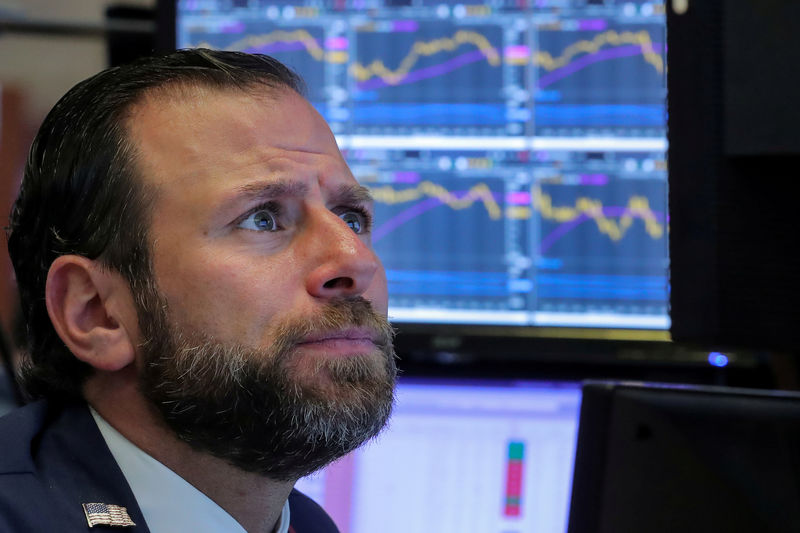 © Reuters. FILE PHOTO: A Specialist trader works at his post on the floor of the NYSE in New York
© Reuters. FILE PHOTO: A Specialist trader works at his post on the floor of the NYSE in New YorkBy Trevor Hunnicutt
NEW YORK (Reuters) – There is no more mistletoe hanging above the markets.
The romance U.S. fund investors once had with the stock market was put to rest in 2018 when buy the dip turned into sell the rip.
For evidence, look no further than exchange-traded funds (ETFs), which hold baskets of stocks across the market and have been a primary buyer throughout this bull market.
In 2017, investors often added more cash to the funds when the performance sank. Stocks glided higher.
Equity ETFs during the year were responsible for more demand than pension funds, mutual funds and foreign investors, according to Goldman Sachs Group Inc (NYSE:) research. And throughout the bull market, ETFs have been consistent buyers even when other investors dropped out.
(GRAPHIC-2017: Buy the Dip – https://tmsnrt.rs/2GuJSoz)
But this year investors were faced with the prospect that U.S. Federal Reserve rate hikes, high corporate borrowing, rising relative yields on short-term bonds, U.S.-China trade tensions and slowing growth could leave a strong U.S. economy flailing.
Fund managers failed to successfully navigate markets that swung between record highs and dramatic lows – the average stock and bond fund will report negative returns for the year. The average U.S.-based equity fund is down 6.3 percent in the year through December 11, while its bond counterpart is down 0.9 percent, Lipper said. The market has only fallen further since then.
So ETF investors, among the main sugar daddies supporting this near-decade rally in U.S. stock prices, refused to play the role of buyer of last resort. While demand is still positive for the year, ETF buyers were less willing to step in during the worst moments.
(GRAPHIC-2018: Sell the Rip – https://tmsnrt.rs/2GzSRFc)
Individual investors are the most pessimistic about stock performance they have been in more than five years, with 49 percent expecting the market to fall in the next six months, according to a survey by the American Association of Individual Investors.
Tom Roseen, head of research services at Lipper, said investors are not going to wait around for another period like the 2008 financial crisis, when some stock funds lost more than half their value.
“They’re not buying the dip like they were, and they’re selling,” he said.
The wariness of the ETF buyer has only added to a market decline as the Fed pulls back from policies meant to encourage investors to take risks after the financial crisis. And the weakening investor psychology could keep markets on edge well into 2019.
Fusion Media or anyone involved with Fusion Media will not accept any liability for loss or damage as a result of reliance on the information including data, quotes, charts and buy/sell signals contained within this website. Please be fully informed regarding the risks and costs associated with trading the financial markets, it is one of the riskiest investment forms possible.
Source: Investing.com



























